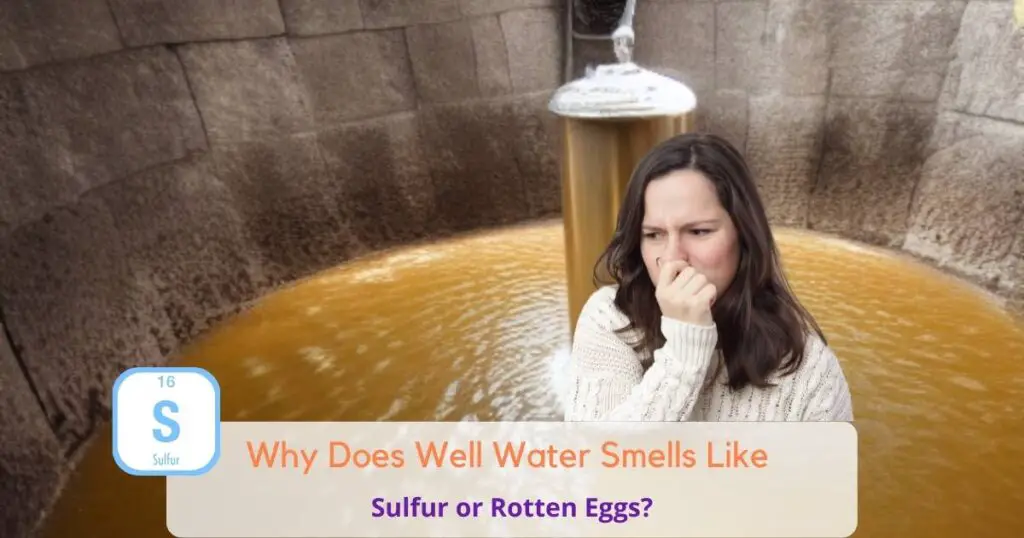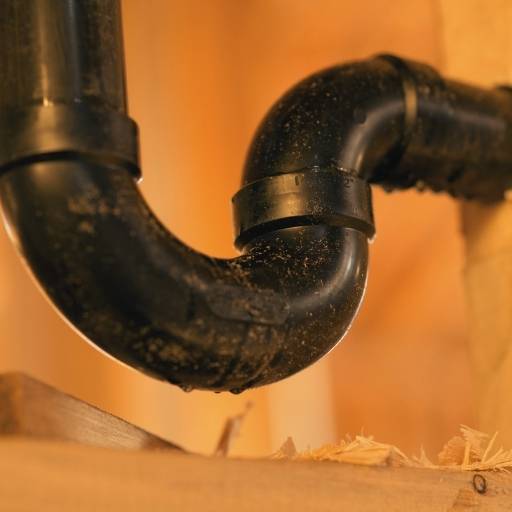
It was pretty jarring when I first noticed a sulfur smell coming from my bathroom faucet. But after a few weeks, I just got used to it.
When my parents came to visit me and complained about the rotten egg smell in the bathroom, I realized something needed to be done.
Well water can smell like sulfur (or like rotten eggs) due to excess Hydrogen sulfide gas (H2S). It usually occurs naturally due to reactions between rocks and soil. To remove high sulfur levels from well water, install a specialized filter that uses oxidization to remove the smell.
If you’re wondering why your well water smells like sulfur, read on to find out the answer and which kind of water filter you need to remove it.
Causes of sulfur smell in well water
Sulfur-reducing bacteria can cause a sulfur smell in your well water. When sulfur is present in your water, the bacteria feed off small amounts of sulfur, creating hydrogen sulfide gas and the rotten egg smell we all hate as a byproduct. [1].
Presence of sulfate in rocks and soil
Sulfates are naturally occurring minerals found in rocks and soils. If these minerals are present in and around your water, they can seep into your groundwater [2].

Gypsum is found underground in large amounts and is one of the most common contributors to sulfate in groundwater [3].
As explained above, the rotten egg smell is caused by bacteria feeding of the sulfate.
Sulfur Bacteria in a Well
Sulfur-reducing bacteria can grow inside the well itself, on the well casing, or in the pipes and the pump. [4]
Other causes of sulfur (rotten egg odor) in water
Well water isn’t always the cause of bad sulfur smells.
Before you blame your well water for the rotten egg smell, it’s essential to be sure there isn’t another explanation.
Chemical reactions in a water heater

Bad sulfate smells can build up inside a hot water heater tank. If warm water is left inside the tank for too long, bacteria build up, and the smell will appear when you next turn on the water. [5].
To prevent this, always remember to turn off your water heater’s power if you’re going on vacation. And avoid leaving water sitting in the water heater tank for long periods.
A water heater odor killers can treat the problem, and they usually contain hydrogen peroxide.
Badly maintained water softeners
A poorly maintained water softener can suffer from many problems. One of those is a bad sulfur smell.
If your water softener hasn’t been cleaned recently, it can become infested with sulfur bacteria. Ensure your softener system and brine tank are cleaned once a year to avoid this [6].

Effects of sulfur in the water
Hydrogen sulfide gas is not usually a threat to human health in the low concentrations it is usually found in the household. Most people can detect its presence in concentrations well 0.5 mg/L, so it’s usually dealt with before it can cause problems [7]
Despite being a low health risk, hydrogen sulfide gas may also cause several other problems:
- may produce a laxative effect
- is highly flammable and has a chance of exploding [8]
- can cause slime or black stains on plumbing and kitchenware
- can discolor copper and brass utensils
- can cause corrosion on metal pipes
How to detect sulfur in well water
To detect sulfur in your well water, you can follow three main steps.
1. Look for signs of sulfur bacteria and hydrogen sulfide gas
Check your pipes, silverware and fittings for signs of corrosion or black stains. The presence of either problem suggests that sulfur gas is present in your water supply.
Next, look for evidence of white, gray, or black slime in and around your bathroom and kitchen fittings. This is evidence of sulfur-reducing bacteria.
If the slime is red, it could suggest the presence of iron bacteria in the water instead.

2. Have your water tested
The only way to be 100% sure what’s causing your problem is to have your water tested professionally.
A test will tell you whether you have Hydrogen Sulfide gas in your water supply and at what level. The results of this will give you the information you need to choose the right water filter treatment option.
3. Locate the source of the problem
First, check both hot and cold water tanks separately. You can rule out the water heater if the smell comes from the cold water tap.
Next, find a faucet NOT connected to your water softener and turn it on. If this faucet smells, likely the softener isn’t the cause of the sulfur smell.
The final test is to see if the smell goes away after running the faucet continuously for a few minutes. If the smell doesn’t disappear, your filter system or the well itself is contaminated with sulfur. If the odor does go away, then your groundwater is contaminated.
How to remove sulfur smell from well water
Once you’ve confirmed the presence of H2S and at what levels it’s present, you can choose the best water filter for your situation.
Granular activated carbon (GAC) Filter
For very low levels of Hydrogen Sulfate gas up to 0.3PPM [9], granular activated carbon filters can be effective at removing odor and taste.
At this level, you likely only need to filter the water for drinking purposes. In this case, a GAC water filter pitcher is a cost-effective option.
Aeration Filter
Aeration is a process where air is injected into the water. The Hydrogen Sulfide gas volatilizes into the air bubbles, which rise to the top of the tank and are vented into the air outside the house.
Aeration is suitable for hydrogen sulfide levels up to 2.0PPM [10].
Oxidizing manganese greensand filter
Manganese greensand can remove hydrogen sulfide gas up to 10.0 PPM [11], so it is a good option if you’re dealing with high levels of Hydrogen Sulfide gas.
The filter tank contains greensand media which changes the sulfur gas to solid particles as it passes through the media. The system is then backwashed (or regenerated), and the particles are washed out of the system as waste.
Wrapping up
If you suspect you’ve got a problem with Hydrogen Sulfate gas, get your water professionally tested to be sure.
Following that, installing a manganese greensand filter is probably the best option for most homes experiencing this problem.
